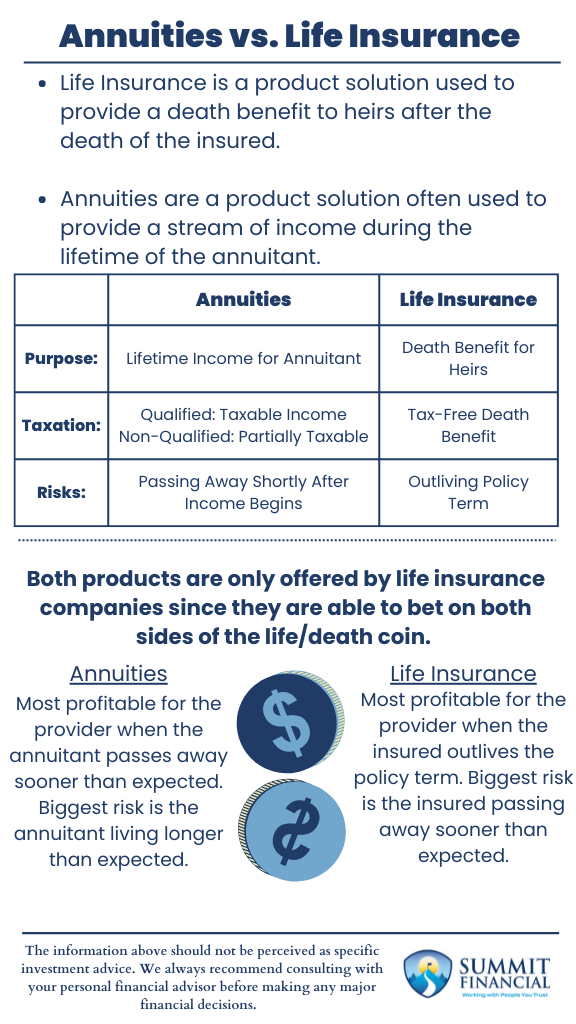
How Life Insurance Works
Life Insurance is a product solution used to provide a death benefit to heirs after the death of the insured.
Why Do People Buy Life Insurance?
There are various reasons to purchase life insurance, but two of the most frequent reasons are to replace the loss of income or to pay off debt.
These policies provide a tax-free death benefit to the beneficiaries when the insured passes away. This death benefit can be used to pay off any outstanding debt, such as a mortgage or a large student loan balance.
Also, the death benefit can be used to support the remaining family members if the insured was the primary income earner.
How Annuities Work
Annuities are a product solution used to provide a stream of income during the lifetime of the annuitant. The annuitant will fund the product beforehand and then have the option to turn on the income benefit.
There is a second category of annuities that are more growth oriented. They do not have the goal of income for life, but instead are more focused on appreciation, with the potential for no investment fees and also protection of the initial investment.
The traditional sense of an annuity is the lifetime income benefit to help provide retirement income. There are very few companies that still offer pension benefits, so an annuity is a way for a retiree to create their own income stream.
The taxation of this income benefit depends on whether the source of funds was qualified or non-qualified, but at least some portion of the income will be taxable in either case.
Why Only Life Insurance Companies Offer Annuities
Only life insurance companies are able to offer annuities based on the risk assumptions.
Life insurance is risky for the provider in case the insured passes away immediately and it becomes the most profitable if the insured outlives the policy term.
An annuity policy is risky for the provider in case the annuitant lives a long time, such as 100 years of age or older, since this may result in an income benefit for 30+ years. Annuities are most profitable for the provider when the annuitant passes away right after turning on the income.
Only life insurance companies can offer annuities because they are essentially playing both sides of the same coin. They sell products that payout when someone dies but they also sell products that payout when someone is still alive.
The average life expectancy is getting higher and higher as advancements in the medical field continue. This means annuity providers will have to pay out income benefits longer, but it also means they will payout less in death benefits from life insurance policies
Choosing Between Life Insurance and Annuities
This blog post is a very high-level breakdown in the comparison of annuities and life insurance solutions.
Both product types offer a variety of different features for the owner to consider.
Everyone has a unique situation, and it is important to meet with a trusted financial advisor before making any major financial decision. Life insurance is not always needed in every case just as lifetime income is not always needed.
Annuities vs. Life Insurance- Key Findings
- Life Insurance is a product solution used to provide a death benefit to heirs after the death of the insured.
- Annuities are a product solution often used to provide a stream of income during the lifetime of the annuitant.
- Life insurance companies only offer both products since they are able to bet on both sides of the life/death coin.
Speak With a Trusted Advisor
If you have any questions about your investment portfolio, retirement planning, tax strategies, our 401(k) recommendation service, or other general questions, please give our office a call at (586) 226-2100.
Please feel free to forward this commentary to a friend, family member, or co-worker. If you have had any changes to your income, job, family, health insurance, risk tolerance, or your overall financial situation, please give us a call so we can discuss it.
We hope you learned something today. If you have any feedback or suggestions, we would love to hear them.
Best Regards,
Zachary A. Bachner, CFP®
with contributions from Robert Wink, Kenneth Wink, James Wink, and James Baldwin
If you found this article helpful, consider reading:
- Navigating College Funding
- Financial Planning Mistakes to Avoid
- Debt Repayment Strategies
- How to Negotiate a Raise
Sources:


